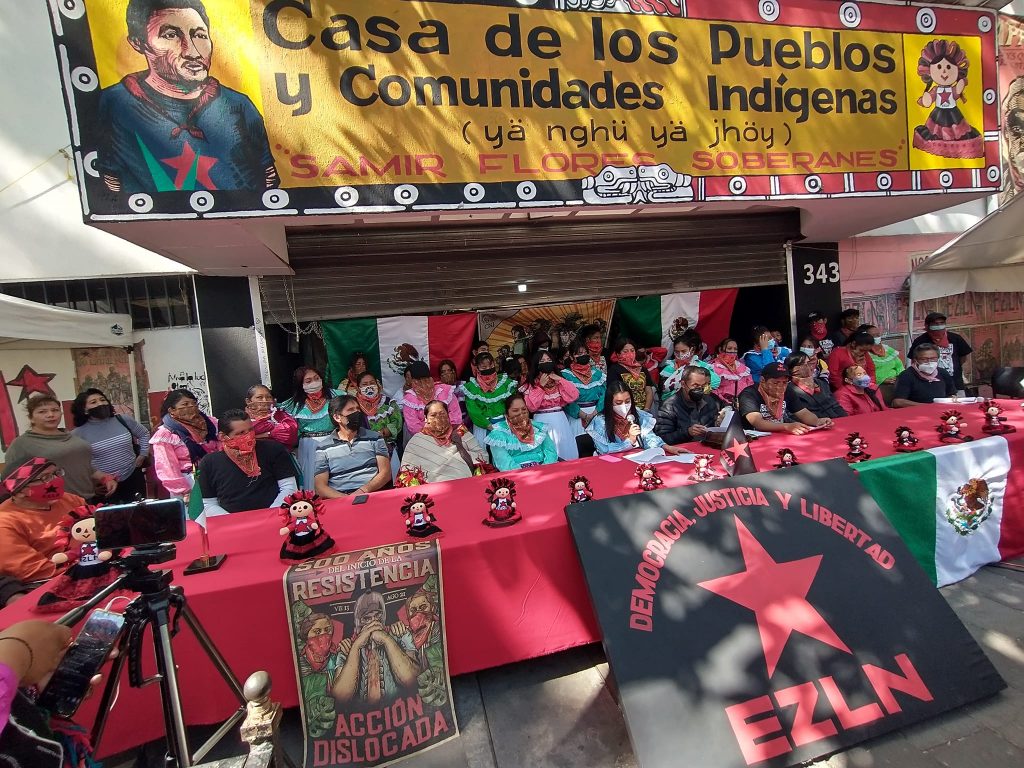
Soberanes. Photo: Facebook
By Gilberto López y Rivas
In these times of the Fourth Transformation (4T)1, in which the head of the National Institute of Indigenous Peoples (INPI), Adelfo Regino, former advisor to the EZLN during the San Andres dialogue, criminalizes the Otomí community in Mexico City — who maintain an occupation of the institution’s offices and converted them into the Samir Flores Soberanes house of the indigenous peoples and communities– it must be reiterated that there has been no substantial change in State policy since the founding of the National Indigenist Institute in 1948.
Today as in the past, and despite the fact that this director is Mixe2, the INPI (National Institute for Indigenous Peoples), as a bureaucratic apparatus of the State, imposes indigenist policies on the peoples as an objectively oppressive, manipulative, and corrosive force and, now carries out counterinsurgency tasks and conflict management for the recolonization of the territories, in the name, once again, of progress and development.
In accordance with the Mexican experience, let us recall that the Latin American nation-states applied indigenist policies with the pretense of assimilating the Indian into the national culture, but in practice, they mediated their specific forms of political and cultural expression. Strictly speaking, the indigenism of yesterday and today seeks to erase cultural diversities from national societies and to integrate the indigenous into the salaried sectors of the countryside and the city. The basis of this position is a kind of unilinear evolutionism in which ethnicity is the counterpart of historical development — the cultural burden that prevents Indians from passing from a caste situation with respect to the larger society, or with respect to complex or national societies, to a class situation — an idea expressed by the Mexican anthropologist Gonzalo Aguirre Beltrán.
As Ernest Gellner pointed out, the project of cultural homogenization based on the idea of one State, one nation and one culture, upon which the success of the advancement of the capitalist system is based, propagates the idea that cultural homogeneity is a condition for the functioning and stability of governability. In this light, the dominant ideology has been well-served by the confusion created by these notions, that nation states sustained their policies of forced incorporation of the peoples, as well as through strategies of linguistic, religious, ideological, and educational standardization, against a prevailing reality that most nations are plurinational, multi-ethnic, and multilingual.
Despite the rhetoric that claims to be seeking to benefit the Indian, indigenism has been a contradiction in driving the independent paths of the peoples toward articulation with the equal and democratic national societies. Indigenism has operated from racial and cultural prejudices based on the supremacy of the European, the mestizo, and the national over the indigenous. It upholds a perspective which exacerbates the domination of a social group, which drives the governmental apparatus, and which attends to another social group that it assumes is incapable of fending for itself, and therefore, requires guidance. This cultural domination denies real access to decision-making in the political system and excludes from the government apparatus the indigenous people who practice autonomy as a form of resistance to recolonization.
Alongside the historical processes in which the legal framework and the political system were constructed, indigenous peoples have governed their lives and organized their communities through their own customs, even during the colonial period. As a form of resistance, the indigenous peoples fled from the reach of the conquerors and settled in territories that were often inhospitable, but at the same time inaccessible to the colonial yoke. It was not until the process of capitalist modernization that many of these peoples had new contact with the systems of political organization and institutions in effect in the metropolis. This contact meant a new confrontation. The expansion of the national, and of the legal framework that supported it, had to clash once again with the autonomy that was reproduced de facto within the communities. While in the past, forms of indigenous community organization such as the republicas de indios (Indian republics)3 were maintained, in the context of the consolidation of the nation state, the indigenous communities and their ways of reproducing life were repressed by military means. The most tragic cases have been, without a doubt, the caste war in the 19th century4, the bloody repression against the Yaqui nation and, in the 21st century, the renewed war against the peoples that today is being waged on the political and ideological fronts, but above all, repeatedly, on the military-paramilitary front.
This article was published on February 4th in La Jornada. https://www.jornada.com.mx/2022/02/04/opinion/016a1pol English interpretation by Schools for Chiapas.
Footnotes
- The Fourth Transformation or 4T is how President López Obrador refers to his administration, denoting an historic period of change which would end corruption and abuses of power, attend to the needs of rural communities, revitalize infrastructure and services, and restore democracy.
- The Mixe are an indigenous people inhabiting the eastern highlands of Oaxaca.
- Under the legal structure of New Spain, the Indian republics were formally separate and until the mid-19th century had somewhat of a protected status in which the Spanish crown protected indigenous land holdings and the communities were a subordinate part of the Spanish legal system. The concentration of indigenous peoples and retention of their communities were operationalized for assimilation into the Catholic church.
- The Caste War of Yucatán (1847-1901) began with a revolt of the Yucatan Maya against the Hispanic population, as a result of land consolidation and dispossession of campesino populations provoked by the sugar cane boom.
